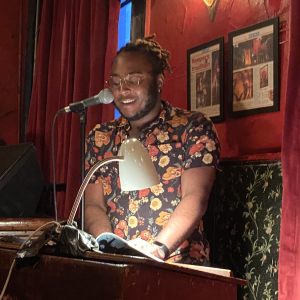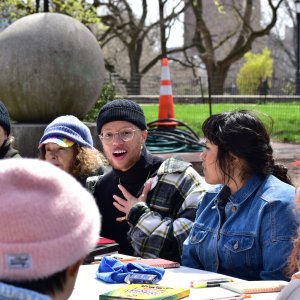Media Do International, a Japanese e-book distribution company, will acquire Seven Seas Entertainment, “the largest independently owned manga publisher in the English-language market.” Seven Seas will continue to operate under its existing leadership team with the same editorial direction, and all its imprints will continue to be distributed by Penguin Random House. The publisher notes that, “The acquisition reflects continued global momentum in manga, light novels, and international storytelling across print, digital, and audio formats, and positions [us] for long-term growth within an expanding worldwide readership.”
Writing Prompts
-
Scientists studying chacma baboons in Namibia have recently reported findings that seem to...
-
In a 2016 interview for the Film Stage, French director Mia Hansen-Løve, known for her...
-
Published in n+1, Jynne Dilling writes a tribute piece to Michael Silverblatt, who...
Tools for writers
Daily News
The digital catalog service Edelweiss has announced a discount tier for publishers, allowing presses to make their titles searchable within the platform, visible in saved filter results, and eligible for inclusion in curated collections for bookstores, libraries, and media sources, reports Publishers Weekly. The company’s CEO, John Rubin, said, “This new offering is designed to provide a clear, affordable option for title visibility, while still preserving the functionality and value that our full-service publisher partners rely on.” This announcement comes on the heels of criticism from the literary community when Edelweiss raised prices and fees following its acquisition by Valsoft in December 2024. Details on the rollout will be announced in the coming months, and the launch of this new offering is expected later this year.
The American Academy of Arts and Letters recently announced their eleven new members for 2026, including, in literature: Sandra Cisneros, Marie Howe, Pico Iyer, Rick Moody, Carl Phillips, and U.S. Poet Laureate Arthur Sze. The academy’s website states, “The three hundred members of Arts and Letters are divided into departments of architecture, art, literature, and music, and are elected in recognition of notable achievement in their fields. Members are elected for life, pay no dues, and nominate and elect new members as vacancies occur.” The new members, alongside three honorary members, will be inducted during the annual Arts and Letters ceremony in May, with Zadie Smith delivering the keynote address.
The American Library Association has taken to social media to “strongly denounce” House Resolution 7661 (H.R. 7661), new legislation initiated on Tuesday aimed at censoring trans narratives and “sexually-oriented material” in public school libraries. Earlier this week, Kelly Jensen wrote about the resolution for Book Riot. “Such a broad definition also ensures that this kind of bill could be applicable in any situation where it would benefit the banners,” argued Jensen. “It isn’t a stretch to see a bill like this used to outright ban all books by or about LGBTQ+ people under the guise of it being ‘sexually oriented.’”
In an opinion piece for Publishers Weekly, Jason Low, publisher and co-owner of the multicultural book publisher Lee & Low books, describes how recent book bans have upended Lee & Low’s Diversity Baseline Survey. Low says the survey, which had become “the industry standard for inclusive hiring practices and accountability” since its initiation in 2017 and which is typically conducted every four years, “will be postponed until further notice” because of “more pressing matters.” Low thanked publishers for the attention given to past surveys before considering the state of inclusivity and diversity in publishing: “As far as books for children go, the diversity movement is by and large in limbo. In the face of extreme censorship that targets diverse authors and titles, our first priority as publishers must shift toward continuing to publish and sell diverse books for children in contentious times. The second priority is to redirect the time and effort we would have spent on DBS 4.0 and channel it toward the fight to ban book bans.”
Tom Hanks is set to star in the film adaptation of George Saunders’s Lincoln in the Bardo, Kirkus Reviews reports. The acclaimed novel, for which Saunders received the Booker Prize, imagines a grieving Abraham Lincoln amid a polyvocal chorus of ghosts as Lincoln’s recently deceased son lingers between death and rebirth. The film adaptation will combine live action and stop-motion animation, and will mark the prolific actor’s first time portraying an American president. (Saunders spoke about conceiving of the novel as such and cultivating “narrative alertness” in a feature by Kevin Larimer in the March/April 2017 issue of Poets & Writers Magazine.)
Ann Godoff, the founder, president, and editor-in-chief of Penguin Press, passed away on Tuesday evening due to bone cancer complications, reports Publishers Lunch. Starting off in the industry as an assistant to Simon & Schuster editor Alice Mayhew, Godoff became a senior editor at Atlantic Monthly Press in 1987, moving to Random House in 1991, where she continued to grow professionally. Penguin Press publisher Scott Moyers writes, “Ann’s impact on American book culture over the past four decades is incalculable. … Beyond the industry accolades, her legacy should be measured in her success in helping authors create indelible new spaces in the minds of readers.”
Tyrant Books, an independent publisher based in Rome, Italy, and New York City, will resume publishing, reports Publishers Weekly, after being largely dormant following the sudden death of its founder Giancarlo DiTrapano in 2021. Luke Goebel, who previously worked as an unpaid assistant at Tyrant Books, will now oversee its editorial direction and expansion, serving as one of two individuals having an acquisition of 50 percent ownership. Regarding the reason behind this acquisition, Goebel notes, “I did it for one reason: to ensure that Tyrant would never be absorbed into any corporate ecosystem whose financial roots trace back to power structures fundamentally misaligned with what this press represents.” The other owner is Matthew Johnson of Fat Possum Records, who provided early funding for the press.
Dan Barry of the New York Times reports on the online scammers that are preying on the literary world as of late. From personal experience, he writes, “It turns out that the fawning e-mails I’ve been receiving are mere specks in a virtual mudslide of fraud descending upon the publishing world.” Overseas scam artists have been using AI to impersonate literary figures such as George Saunders and Colson Whitehead, as well as literary agents, publishing houses, and, more recently, the National Book Foundation, to flatter writers while offering false editorial, publishing, or promotional services for a fee. Many literary associations are issuing warnings so writers don’t continue to fall for these messages. (Read the Poets & Writers alert about such scams that was posted last October.)
Spotify has announced the launch of Audiobook Charts, a publicly-available list of its most popular audiobook titles of the week, Book Riot reports. In addition to listing its overall most-streamed audiobooks, Audiobook Charts will offer breakdowns of popularity by genre in categories including romance, science fiction and fantasy, and memoir. At the top of the inaugurual chart for overall listens is Emily Brontë’s Wuthering Heights as narrated by Billie Fulford-Brown.
A project by a Wesleyan University undergraduate seeks to “help underprivileged youth leaders in Mongolia improve their writing skills and amplify the voices and concerns of their community,” according to the university. A political science major seeking to support peers in her native country, Tamiraa Sanjaajav launched the Nomadvocate Youth Civic Writing Lab to give young Mongolians literacy skills that might in turn translate to political empowerment. “In the first iteration of the program in June 2025, Sanjaajav hosted thirty Mongolian students in-person in Ulaanbaatar, the capital city, for a month-long writing- and discussion-intensive initiative. The second iteration of the program occurred in winter of 2025 online, engaging over one hundred and eighty participants and twenty volunteers.” The program expands this summer to communities in rural Mongolia.
The Booker Prize Foundation has announced the longlist for the 2026 International Booker Prize, an eclectic group “featuring stories of witchcraft, warfare, trauma, transformation, and more.” The list comprises thirteen titles translated from eleven langauges, and includes three debuts. The longlisted titles are The Nights Are Quiet in Tehran (Scribe) by Shida Bazyar, translated from German by Ruth Martin; We Are Green and Trembling (New Directions) by Gabriela Cabezón Cámara, translated from Spanish by Robin Myers; The Remembered Soldier (New Vessel) by Anjet Daanje, translated from Dutch by David McKay; The Deserters (New Directions) by Mathias Énard, translated from French by Charlotte Mandell; Small Comfort (HarperCollins) by Ia Genberg, translated from Swedish by Kira Josefsson; She Who Remains (Sandorf Passage) by Rene Karabash, translated from Bulgarian by Izidora Angel; The Director (Summit) by Daniel Kehlmann, translated from German by Ross Benjamin; On Earth As It Is Beneath (Charco) by Ana Paula Maia, translated from Portuguese by Padma Viswanathan; The Duke (Foundry) by Matteo Melchiorre, translated from Italian by Antonella Lettieri; The Witch (Vintage) by Marie NDiaye, translated from French by Jordan Stump; Women Without Men (Syracuse University Press) by Shahrnush Parsipur, translated from Persian by Faridoun Farrokh; The Wax Child (New Directions) by Olga Ravn, translated from Danish by Martin Aitken; and Taiwan Travelogue (Graywolf) by Yáng Shuāng-zǐ, translated from Mandarin Chinese by Lin King. The winner will be announced on May 19.
In an essay for the Atlantic, John Williams, the former editor of the Washington Post’s now-defunct Book World, argues that an editor should serve subscribers, not data. Amazon founder Jeff Bezos, owner of the Post, recently said, “Each and every day our readers give us a roadmap to success. The data tells us what is valuable and where to focus.” In response, Williams writes: “As a reader of many distinctive publications, I want to be led by them. What makes them special is where they choose to take me, and how much I trust them to do that. In a subscription business, you are not just trying to reach new people, crucial as that is; you are also trying to retain those you already have. Sizable, steadfast subscriber bases are hard-won, and keeping them involves the fulfillment of an unspoken contract as well as the actual one that paying readers sign. I expect publications I support to attempt growth without radically changing the focus or quality of the work or pivoting to some get-traffic-quick scheme every time readership dips over a holiday weekend.”
A new study by the National Literacy Trust shows that only 10 percent of boys age 14 to 16 read daily for pleasure in the UK, according to a report by the Guardian. “While reading declines for both boys and girls in early adolescence, there are ‘signs of recovery’ among girls in later teenage years, but boys’ engagement remains persistently low.”
Over four hundred independent bookstores in the UK will have to pay higher business rates starting in April due to adjustments in the country’s budget, reports Publishers Lunch. Added on to this, some stores’ taxes will be doubled. These financial changes are being called “a disaster” by the UK’s Bookseller Association, which is asking their government for permanent reductions in business rates for booksellers.
The New Yorker’s Casey Cep covers the unlikely success of a bookstore in Alabama with a unique business model. The Alabama Booksmith, run by ninety-year-old Jake Reiss, only sells signed, first editions of hardcover books, mostly at the publishers’ prices. Cep writes, “Because Reiss guarantees sales of several hundred copies, he can sometimes convince publicists to add a book-tour stop in Birmingham, even if it’s just for a lightning signing during which he and his team serve as a kind of human conveyor belt, shuffling signature-ready books by so speedily that the author can make it to a nearby city for another event that same night. When that strategy doesn’t work, he’s not above begging authors directly.”
Ingram Content Group has announced a new digital catalog and galley platform to aid publishers in sharing titles with booksellers, media, and librarians, reports Publishers Weekly. Covered, the new online service from the company, will have a beta launch this fall for a select group of industry professionals with broader industry availability to come in 2027. This platform is meant to serve as a more cost-effective competitor to Edelweiss and NetGalley, the former of which hiked up its prices in 2024, making waves in the literary community.
A New Jersey school district faces controversy after pulling a title from its curriculum in response to a mental health crisis at its schools, NPR reports. After five reported suicide attempts by students at Columbia High School in Maplewood, administrators’ “most immediate response” to the crisis was to remove The Brief Wondrous Life of Oscar Wao by Junot Díaz from its AP English Literature and Composition curriculum. After pushback from parents, students may now read the book with signed permission—terms that PEN America says amount to a book ban. “Book restrictions in schools and libraries are often linked to objections to their treatments of sexuality or to their discussions of race. But the situation in New Jersey is part of a much larger trend, according to PEN America. In a November 2024 report, the group found nearly 60 percent of banned books are young adult titles that specifically depict grief, death, suicide, substance abuse, depression and other mental health concerns, and sexual violence.”
As a federal immigration crackdown continues to target Minneapolis and St. Paul, two literary adovacy organizations are among those that have stepped up to support children sheltering in place to avoid ICE raids, Publishers Weekly reports. The Boston literary nonprofit Reach Out and Read launched a Books for Neighbors initiative in the Twin Cities in late January, adapting its usual model of distributing books at pediatrician well visits to instead offer materials through mutual aid groups and community organizations. Separately, A Book of One’s Own, a nonprofit that works to provide books to hands of Minnesota children, has shifted focus to supporting families in the Twin Cities: “To date, 4,000 Spanish-language books have been donated to 25 public school districts—including 500 books to Liam Conejo Ramos’s school after the five-year-old was detained by ICE. A lesser quantity of Hmong and Somali books also have been donated to schools for distribution to students.”
For the New York Times, Parul Sehgal considers Toni Morrison as “a wave of Morrisoniana” deepens scholars’ sense of her ambition: “to confront the immense silences in the archives where Black life and thought are concerned.” Recent works including Toni at Random by Dana A. Williams, On Morrison by Namwali Serpell, and Language as Liberation, a volume collecting Morrison’s Princeton lectures, comprise an ever-richer portrait of her genius and legacy, also felt in the reissuing of Morrison’s eleven novels with new introductions by contemporary literary luminaries. “When a writer dies, what survives of her work is often that which is most legible, that which can be taught—her craft and technique, the public statements that distill her aims and themes. But what gives Morrison’s novels their force lies below the skin of language and outside the logic of neat précis. Morrison seems to know forbidden things—all the secrets of childhood and maternity and the marriage bed.” (An excerpt from Toni at Random, on Morrison’s career as an editor at Random House, appears in the July/August 2025 issue of Poets & Writers Magazine.)
Literary Events Calendar
- March 3, 2026
Book Launch: James Cahill, THE VIOLET HOUR, Lisson Gallery NY, March 3, 6:00pm
Lisson Gallery6:00 PM - 7:30 PM - March 3, 2026
Adam Strong with Gigi Little
Annie Bloom's Books7:00 PM - 8:00 PM - March 3, 2026
Lyrical Rhythms: Open Mic and Chill
B Side Lounge8:00 PM - 11:00 PM
Readings & Workshops
Poets & Writers Theater
Most Recent Items
Classifieds
Writing contests, conferences, workshops, editing services, and more.
Jobs for Writers
Search for jobs in education, publishing, the arts, and more.










